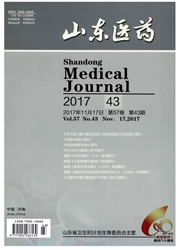

 中文摘要:
中文摘要:
目的 建立SHP-2野生过表达型(WT)及激活突变型(MT)稳定转染的肝癌HepG2细胞系,研究SHP-2激活突变及野生过表达对肝癌细胞增殖能力的影响.方法 将已经构建成功的WT SHP-2(WT组)和MT SHP-2(MT组)及空载体pcDNA3.1(空载组)分别转染到人肝癌HepG2细胞中,同时设未转染细胞作对照组;Westernblot法检测细胞中SHP-2蛋白的表达水平;MTT法检测细胞增殖情况;平板克隆和软琼脂集落形成实验检测细胞集落、克隆形成能力.结果 成功的将SHP-2突变型和野生型真核表达载体转染到人肝癌HepG2细胞中;MTT结果显示,对照组和空载组细胞增殖速度接近且增殖慢,而MT组和WT组细胞增殖速度明显加快,WT、MT组与空载组、对照组比较,P均<0.01;细胞克隆形成的数量多于空载组和对照组,P均<0.01.结论 成功构建了WT及MT稳定表达SHP-2的HepG2细胞株;SHP-2激活突变及野生过表达促进肝癌细胞增殖能力.
 英文摘要:
英文摘要:
Objective To construct the HepG2 cell line stably transfected by SHP-2 over-expression wild-type (WT) and gain-of-function mutation ( MT), and to investigate the effects of SHP-2 gain-of-Function mutation (MT) and over-ex- pression wild-type (WT) on proliferation capacity of liver cancer cells. Methods The successfully constructed eukaryotic expression vector of SHP-2I)61c/~ ( MT ), wild-type (WT) and vector pcDNA3.1 were transfected into HepG2 ceils, mean- while, the untransfected ones were used as controls. Western blotting was applied to detect SHP-2 protein expression levels of transfected and untransfected cells. MTI" assay was used to detect the cell proliferation. Plate colony and soft-agar colony formation assay was applied to detect cell colony formation ability. Results SHP-2 mutant and wild-type eukaryotic ex- pression vector was successfully transfected into HepG2 cells. MTY assay showed that the proliferation rate of the controi group was similar to that of the no-load group and with slow proliferation, while in the mutant group and over-expression wild-type group, the cell proliferation was significantly faster. Significant differences were found between the latter two groups and the first two groups (P 〈 0.01 ). Plate colony and soft-agar colony formation experimental results show that the number of colony-forming cells in the mutation group and the over-expression wild-type group was more than that in the no- load group and the control group, and with statistically significant difference (P 〈 0.01 ). Conclusions HepG2 cell line stably transfected by SHP-2 over-expression wild-type (WT) and gain-of-function mutation (MT) is successfully estab- lished. SHP-2 gain-of-function mutation and over-expression wild-type promote the proliferation capacity of liver cancer cells.
 同期刊论文项目
同期刊论文项目
 同项目期刊论文
同项目期刊论文
 期刊信息
期刊信息
